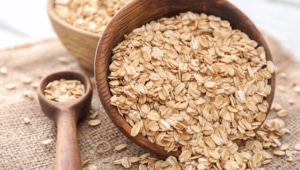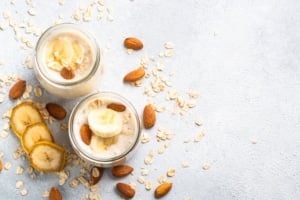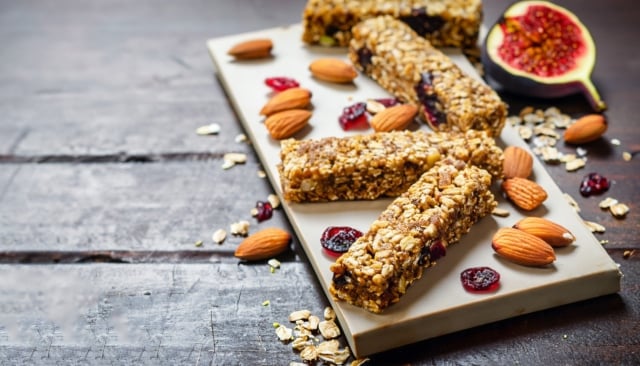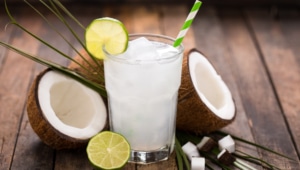5 Health Benefits of Oatmeal + 5 Tips and Hacks

Why not add hearty, fiber and protein-filled food to your daily menu? Keep chugging along to find out some neat facts and life-changing health benefits of oatmeal, plus some slick tips on how to incorporate oatmeal into your daily routine.
Imagine your body is like a city with highways, skyscrapers, and bustling citizens all working hard to keep things running. Now imagine the fuel for that city is oatmeal, supplying it with vitamins and minerals, which helps keep the heart pumping like a well-oiled engine. Your digestive tract? Healthy as a horse.
Interesting Facts About Oatmeal

Interesting Facts About Oatmeal
Stick around, folks. We’re about to dive into the oat-filled treasure chest and unveil some scrumptious oatmeal facts that’ll keep your brows raised.
Origin of Oatmeal
Any veterans out there know their roots, right? Well, oatmeal’s got roots that dig deeper than a 100-year-old oak tree. See, oatmeal, or as the lab coats like to call it, Avena Sativa didn’t just pop up at your local supermarket.
Cereal grains, like oats, have a long, intertwined history with humankind, especially in the good ol' United States.
Let’s do a little time-tripping here. Flashback a couple of centuries ago, when folks discovered they could eat oats, originally a weed that popped up in barley and wheat fields.
Essential nutrients supplied by baked goods made from oat grains kept those early settlers hale and hearty.
Fast forward to today. We’ve got oatmeal, a creamy, warm delight that’s not just regular comfort food. It’s got the nutritional profile of a superhero – high in fiber and protein, rich in antioxidants, improves insulin sensitivity, and can even give your immune system some muscle.
Ingredients

Ingredients
Here’s the cereal scoop. Traditional oatmeal consists of four fundamental ingredients – water, a dash of salt, and the star of the show, dry oats. However, don’t be fooled by the simplicity, folks.
These dry oats pack tons of healthful punch – from soluble fiber in oats that smooths out your digestive tract to colloidal oatmeal that can give your skin a kindergarten-fresh look.
The beauty of oatmeal lies in its versatile canvas. It’s like a patch of sunshine in a nutritional tempest. You can jazz it up with fruits, nuts, honey, spices, or even a little something from the United States Department of Agriculture’s recommended food groups.
As long as you keep things balanced, oatmeal will keep your immune system just as robust as a horseshoe and your gut microbiota as harmonious as a community picnic.
Is Oatmeal Gluten Free?

Is Oatmeal Gluten Free?
So, let’s dive into the world of oats and gluten. Gingerly tiptoeing around the subject, oatmeal is technically gluten-free. When we say technically, we mean oats naturally do not contain gluten. They’re like that kid who kept his sneakers clean while the rest of us were playing in the mud.
However, here’s where it gets really tricky. While oats themselves are gluten-free, most commercial oatmeal might not boast the same gluten-free claim. How’s that, you ask?
It’s all about cross-contamination. The machinery used to process oats often handle other grains such as wheat and barley which contain gluten. So our squeaky clean oats can end up with some unwanted gluten passengers, like hitchhikers that weren’t invited to the trip.
Not all is lost though. Some oatmeal products are certified gluten-free, which means they’re processed in a way that avoids cross-contamination.
This allows folks with Celiac Disease or gluten intolerance to enjoy oatmeal without triggers. It’s like a VIP section for oatmeal lovers with tummy issues. Just look out for those magic words on the packaging, "Certified Gluten-Free".
Gluten aside, oatmeal is nutritionally stacked. It’s like that nerdy kid with all the right answers. With an arsenal rich in antioxidants, oatmeal supports heart health and regulates blood sugar levels.
For those used to seeing gluten pop up in their favorite baked goods, colloidal oatmeal offers a worthy gluten-free substitute. Just remember, all that glitters isn’t gluten.
Is Oatmeal a Cereal?

Is Oatmeal a Cereal?
Stepping into the ring is our beloved oatmeal. On the opposite corner are a variety of breakfast items we fondly label as 'cereal'. So, oatmeal or no oatmeal, that is the question.
Turns out, oatmeal operates in the grey area. It’s the undercover detective of breakfast foods; it plays both sides. Technically, oatmeal is made from a type of grain called oats, which makes it a cereal grain.
Think of it as graduating from the cereal family with honors. But wait. When folks say cereal, their mind often wanders off to cold, crunchy stuff floating in milk, usually shoveled down hurriedly before rushing to catch the bus.
In that sense, oatmeal, which is often cooked into a warm, creamy porridge, doesn’t exactly fit the stereotypical cereal mold. It’s almost like a rebel, shaking up cereal norms with its unique texture and taste. But hey, isn’t variety the spice of life?
Is There a Difference Between Oatmeal and Oats?

Is There a Difference Between Oatmeal and Oats?
Even though they look like twins at a high school reunion, oats and oatmeal are not exactly the same. Now, here’s the lowdown.
Oats are whole grains – unprocessed, their coats are still on and they’re waitin' to be used in any way you want. On the flip side, oatmeal is made from processed oats – think of them as clean-shaven oats put through the milling process.
They can be rolled, cut, or steamed, essentially making it easier to cook and eat.
Then you got your Scottish oats and instant oats editions that essentially are different forms of oatmeal. The Scotts essentially stone-grind their oats, which gives them a creamy and soup-like consistency when cooked. Instant oats, on the other hand, they’re pre-cooked, dried, and rolled thin.
You might as well have them ready in your bowl before your coffee is even brewed. Just remember, though, while they’re convenient, they may lack the robust, nutty flavor of other types of oatmeal.
So, are oats identical twins to oatmeal? No, siree. Oats are the raw deal, and oatmeal is their more commonly known derivative. It’s like comparing wheat to bread. They’re the same peeps, but wheat’s still hustling on the farm, while bread is ready to satisfy your hunger in a sandwich.
Nutritional Facts and Calories of Oatmeal

Nutritional Facts and Calories of Oatmeal
Swap your sugar-filled kids' cereals with healthier oatmeal, and you’re in for a joy ride to a good health town. A single cup of oatmeal carries around 150 calories and is packed with essential nutrients. This little warrior doesn’t just satisfy your hunger but also fuels up your day.
One thing that might surprise you is that oatmeal is not loaded with sugar, naturally. However, the catch is to watch out for flavored varieties or the ones labeled as ‘instant’.
They can sometimes carry the burden of added sugars – way too many for their good. Hence, it’s advisable to keep it simple and prefer unsweetened oatmeal. Then, dance it up on your own with fresh fruits, nuts, or a dollop of honey for sweetness.
Remember, fellow townsfolk, balance is what you need in everything in life. Sure, oatmeal’s got solid nutrition going for it, but be wary of the portion sizes. Eating the right amount of oatmeal, mixed with a well-balanced diet will have you steppin' light and feelin' right.
Health Benefits of Eating Oatmeal

Health Benefits of Eating Oatmeal
Dig into your bowl of steamy oatmeal for its myriad health benefits. Oatmeal, a humble warm breakfast staple, is power-packed with essential nutrients including fibers, proteins, vitamin C, and various B vitamins.
The presence of these nutrients boosts energy levels, supports blood cell formation, and enhances immune function predominantly through natural killer cells.
Did you know oatmeal contains oat groats that have been steamed and rolled? These groats help regulate blood sugar, lower cholesterol, and even lighten up your skin.
Skin Benefits

Skin Benefits
Bet you didn’t know that the humble oatmeal is chock-full of goodness for your skin.
Slapping on some oat milk on your face might seem silly, but hey, who’s questioning grandmotherly wisdom? So, let us break it down for you. Oatmeal rocks a boatload of anti-inflammatory effects that helps soothe and regenerate your skin.
We are talking acne, eczema, rashes, you name it. An easy-peasy oatmeal mask can work wonders for your skin, reducing inflammation and irritation.
Now here’s the kicker. Avenanthramides – tough to say, even tougher to spell – are unique antioxidants found in oats. Been through the scrubbing, the scouring, the face rashes? Thank your lucky stars, cause not only do avenanthramides decline inflammation, but they also halt those pesky itchy feelings.
So before you dole out your hard-earned readies on fancy skincare products, a reminder – nature itself hands you an impressive skin aid in the shape of oatmeal.
Need another reason to slather on some oatmeal goodness? Oatmeal boasts a natural cleaning agent called saponins.
They clean your skin without drying it out or leaving it feeling tight. It’s like giving your skin a warm bath and a hug. Granny was on to something, guess we really ought to pay more heed to her wisdom.
Cholesterol Regulation

Cholesterol Regulation
Now I am no health expert, but listen, when the American Heart Association sends a nod to oatmeal, you sit up and take notice.
Apparently, oatmeal has a little beastie called "soluble fiber" or beta-glucan – if you’re into the science stuff. The thing hunts down "bad cholesterol" like it’s in a high-stakes action movie. Don’t ask me how it just does.
Swapping doughnuts for oatmeal isn’t easy, but take it from me, it’s worth it. Beta-glucan acts as a gatekeeper in your body. Its job? To keep bad cholesterol out of your arteries where it can cause trouble.
We’re talking less heart disease, less stroke. You know, the serious stuff. The health gods offer no shortcuts, my friend, but they did give us oatmeal.
Here’s the cherry on top. Research shows people who regularly down oatmeal are 14 percent less likely to fall prey to cardiovascular diseases.
Those eating the most have a whopping 22 percent lower risk of type 2 diabetes too. Now those are odds I can get behind. The heroes in this story might look unassuming, but remember, great power often comes in small-grain – packages.
Reduces Risk of Certain Cancers

Reduces Risk of Certain Cancers
You see, since oatmeal is rich in certain unique components, it partners in our bodies' mission to keep ill health at bay. Oats contain Avenanthramides, a type of antioxidant that, like a slow and steady goalie, helps slow cell mutations.
Makes sense then that the good bowl of oatmeal is a solid agent in the fight against certain cancers, specifically colon cancer.
Just like every cloud has a silver lining, oats also carry the gleaming treasure of bran and germ. These little fellas are loaded with vitamin E, copper, selenium, and zinc. What’s cool about these?
Well, they style themselves as anti-carcinogenic compounds, springing into action like superheroes against menacing cancer-causing villains.
Remember how Mom always told you to eat your fiber? She wasn’t just pulling your leg. Dietary fiber’s pretty darn serious when it comes to health benefits. That oatmeal you’re scooping in your spoon is a jackpot of fiber content.
And according to some smart folks out there, high-fiber grub like oatmeal could help lower insulin resistance, one of the main culprits in the roll call for colon cancer.
Improves Blood Sugar

Improves Blood Sugar
Here’s where things get really interesting. Do you know what’s a real baddie when it comes to health? Skyrocketing blood sugar. But guess what fellas, oats come galloping to the rescue again.
There’s this thing called glycemic load. Kind of like the full picture of food’s impact on blood sugar. The cool part? Oats don’t hit that glycemic load too hard, making it a pretty smart choice for folks battling blood sugar issues.
Now, you might be wondering about patients with type 2 diabetes. Can they benefit from oats too? Well, a huge yes. Big hats off to our unassuming oatmeal – it can help control blood sugar in folks dealing with such conditions.
Next time you’re out shopping, remember oats are more than just filling; they’re also a health-friendly option for folks wrestling with diabetes.
Deep inside those humble oats is a treasure trove of both soluble and insoluble fiber. These are no-nonsense health warriors, taking blood sugar head-on and helping keep it in check. Who knew a cozy bowl of oats could wield such a mighty sword of health, right?
Another neat factoid about oatmeal, it not only fights it out in the blood sugar arena, but oats are also rich in other nutrients. Think protein, vitamins, and minerals.
Balanced nutrition that’ll not just keep your hunger pangs in check, but helps your body keep up its fight against rising blood sugar.
May Reduce Risk of Childhood Asthma

May Reduce Risk of Childhood Asthma
Seasoned healthcare professionals draw from the deep well of medical wisdom to say that oatmeal, that humble centerpiece of the breakfast table, might actually help reduce the risk of childhood asthma.
A hearty, tasty, and nutritious breakfast, oatmeal is not just for the palate, it’s got some bulldog defense actions in play for the little ones too. C’mon, let’s dip our toes in this warm oatmeal bath of facts.
You see, some findings suggest infants who are introduced to oatmeal before they turn the six-month milestone could be dodging that notorious troublemaker, asthma.
Like a tough linebacker blocking a rampant defensive end, oats get in the way of this chronic respiratory issue. Asthma, that raggedy playground bully, messes with those small airways that shuttle the life-giving air in and out of our lungs.
Children grappling with asthma find themselves huffing, puffing, and coughing more often than not.
Remember that rhyming nursery tune, "Cough and sneeze, do as you please"? Yes, no one wants to sign their kiddos up for that choo-choo train. And besides being a premium source of fiber, essential minerals, and vitamins, oatmeal pulls the rug from under asthma in the early years of your child’s life.
By introducing oatmeal to the infant diet, the seeds of a strong defense against childhood asthma are planted. It’s like a caring coach running through some crucial drills with the team before the nastiest game of the season.
Other Healthy Benefits of Oatmeal

Other Healthy Benefits of Oatmeal
Hang on a sec, we’ve got more up our sleeve. The laundry list of health benefits of oatmeal doesn’t end with the early window tackle on asthma. Oats are round-the-clock medics with a range of tricks in their toolbox, from improving heart health to helping in blood sugar control. Talk about a versatile powerhouse.
Oatmeal Bath

Oatmeal Bath
Alright, park your keister on that recliner, and let’s spill the tea on this phenomenon called the oatmeal bath. Startled? Well, buckle up because oats are chucking a curveball here.
Much more than a hearty breakfast staple, oats double up as skin-loving spells that have been known for centuries. It isn’t some hocus-pocus but has rave reviews coming straight from white-coat geniuses.
An oatmeal bath, despite its peculiar naming, has a solid standing amongst age-old remedies. It’s like having your favorite comfort food…but for your skin.
To imagine, visualize pouring yourself a relaxing bath, only instead of fancy salts or bubbles, you’re sprinkling in oatmeal.
Like a comforting blanket on a chilly night, it wraps the skin in a supportive, soothing embrace. Think of it as a home spa, giving your skin some TLC with the humble oats. No magic wand here, just oatmeal working its charm.
Colloidal Oatmeal

Colloidal Oatmeal
No, colloidal oatmeal isn’t a fancy oatmeal brand that’ll cost you an arm and a leg. It’s ground-up oats that are so fine, they form a suspension in liquid. Hence the fancy name. Let’s get into what it’s good for.
Colloidal oatmeal surely flexes its muscles when it comes to skincare. Your skin, beat up by the daily grind, will appreciate this. Think back to those times your Grandma dabbed your itchy rash with oatmeal paste – it’s the same story.
You see, those tiny little oats are best buddies with your skin, helping soothe agitations, moisturize, reduce itching, and act as an antioxidant. So, swap your usual clay mask with colloidal oatmeal. It’ll make your battle with acne or eczema a walk in the park.
Disadvantages and Potential Risks of Consuming Oatmeal

Disadvantages and Potential Risks of Consuming Oatmeal
Now, oatmeal isn’t a miracle worker. It’s got plenty of merits, sure. But like anything not given to us by Gandalf himself, it’s not devoid of flaws and dangers. First, it’s high in carbs.
That could be trouble if you’re on the prowl for a low-carb meal. Tame that calorie beast. And if weight loss is the priority one on your vision board, you might want to skip its sweet siren song.
Second, potential food allergens. I know it sounds odd, but people can be allergic to oats, just like shrimp or peanuts.
And if you have gluten sensitivity, remember that oats can sometimes be cross-contaminated in processing, despite being gluten-free. Call me crazy, but a bellyache or hives doesn’t sound like a great breakfast side dish to me.
Lastly, be cautious if you’re battling any stomach problems. Constipation, bloating, stomach pain – oatmeal can sometimes crank it up a notch.
Now, none of this is to say oatmeal is evil and you should swear an everlasting vendetta against it. Just a friendly heads-up about the bumps on this otherwise smooth ride.
Is Oatmeal Good for You in Pregnancy?

Is Oatmeal Good for You in Pregnancy?
And for you, expectant moms, oatmeal is like that friend who randomly calls to check up on you. It gets two thumbs up in terms of nutritional value. Super rich in vitamins and minerals, like Vitamin B, Calcium Iron, and Magnesium, it brings serious muscle to your pregnancy diet.
Whole grain food like oats can help control your blood sugar levels and get you some much-needed fiber. Plus, it’s a sultry source of folic acid that plays a crucial part in easing any neural tube defects in your baby.
So, oatmeal isn’t just 'Good' for you in pregnancy; call it the nutritional Santa Claus who’s here to deck your belly with health.
Is Oatmeal Good for Babies?

Is Oatmeal Good for Babies?
Oatmeal is mighty fine for babies. It’s right wholesome and chock-full of nutrients. One serving can give a baby a good dose of iron, which is crucial for brain development.
Best to introduce it when your tyke’s above 6 months old. That’s ’cause their little tummy needs to be ready for solids. What’s good too is that, being a gluten-free grain, there’s less chance for those pesky allergic reactions.
In the meantime, best to consult your pediatrician to ensure it’s the right time to put oatmeal on your baby’s feeding chart.
Can Dogs and Cats Have Oatmeal?

Can Dogs and Cats Have Oatmeal?
Well now, it isn’t just us humans who can enjoy a bowl of oats. Dogs and cats can have their share of oatmeal too. Mind you, it’s got to be cooked and served plain – you can’t mix in the sugar and milk we humans love.
Just like for us, oatmeal for pets is a good source of fiber and could help keep their digestion running smoothly as silk. But remember, everything is in moderation. Too much of a good thing can turn bad real quick.
Tips and Hacks on Oatmeal

Tips and Hacks on Oatmeal
Kicking up your oatmeal game isn’t as tricky as beating a rattlesnake at a game of hide and seek. Here are a couple of tips to get you started and make your bowl of oatmeal something to look forward to every day.
Eat Oatmeal for Breakfast

Eat Oatmeal for Breakfast
Let me just say this, folks – starting your day with a bowl of oatmeal is like pumping premium gas into your pickup. Your body just goes, "I’m ready for anything."
Overnight oats are the ultimate convenience. Mix ’em up the night before, put ’em in the fridge, and come morning, you’ve got yourself a hearty bowl of oatmeal.
Making Your Oatmeal Water
Ever heard of oatmeal water? No? Well, it’s a nifty little trick to squeeze out nutrition from their oats. It’s pretty straightforward and, who knows, you might just find it downright delicious.
Just simmer some oats in water till they’re all tender and the water’s looking milky. Strain ’em, cool the water down, and that’s your oatmeal water. Great for keeping you hydrated and bursting with the goodness of oats. It’s like having oatmeal without the oatmeal, if you catch my drift.
How to Make Healthy Oatmeal Cookies

How to Make Healthy Oatmeal Cookies
Now, if you want a healthy breakfast that’s easy to whip up and delicious, look no further than oatmeal cookies. Yup, you heard it right. Oatmeal isn’t just for your bowl; it can end up in cookie shape as well.
Bet you didn’t see that one coming, huh? According to the state university’s nutritional studies, using minimally processed grain oats can help with weight control, making it a perfect ingredient for a breakfast cookie.
The oat fiber in oatmeal has been shown to reduce the risk of cardiovascular disease per the national institute’s studies. To make healthy oatmeal cookies, just swap out traditional ingredients like white flour and loads of sugar with whole-grain oats and natural sweeteners.
Mix in your favorite healthy extras like raisins, nuts, or dark chocolate chips. Bake and hey presto, not just a cookie, but a breakfast of champions in your hand.
The Best Way to Combine Oatmeal With Other Foods

The Best Way to Combine Oatmeal With Other Foods
You ever wonder how to jazz up that bowl of oatmeal, and make it taste like something cooked up by a fancy chef? It’s not as hard as it sounds. Use that ol' steel blade in your kitchen to chop up some fresh fruits, nuts, and yes, even vegetables.
Throw them in with your oatmeal and watch as it transforms from a plain Jane porridge to a flavorful bowl of wonder. Really, the possibilities are only limited by your imagination, and maybe what’s in your fridge.
Make Oatmeals Taste Better

Make Oatmeals Taste Better
The charm of oatmeal lies in its simplicity and the fact that you can tune it to your taste. Let’s start with the grain itself. Those whole oat kernels, they’ve got a sweet, nutty taste to them.
But if you want them to taste even better, toasting them in the oven can bring out their flavor. Think of it like the extra mile, you know? A little bit of effort, but the reward? Mouthwatering.
Now, here’s another fact. Oats are full of complex carbohydrates. These break down into short-chain fatty acids when fermented.
In simpler terms, these acids make your oatmeal taste a tad bit tangy, give it a bit of a zing. For added flavor, try mixing in some cinnamon, maple syrup, or a dollop of Greek yogurt.
It’s like bringing the carnival to your breakfast bowl. So there you have it, a simple way to make your oatmeal taste better, and enjoy eating it for a change.
- Tomato Juice. Health Benefits + Tips.
- Asparagus. Benefits for Your Health.
- Mango. Benefits and Side Effects.
- Onions. Health Benefits and Tips for Use.
- Spinach. Benefits and Exctiting Facts.
- Peanuts. Health Benefits & Tips and Hacks.
- Dark Chocolate. Health Benefits and Tips.





